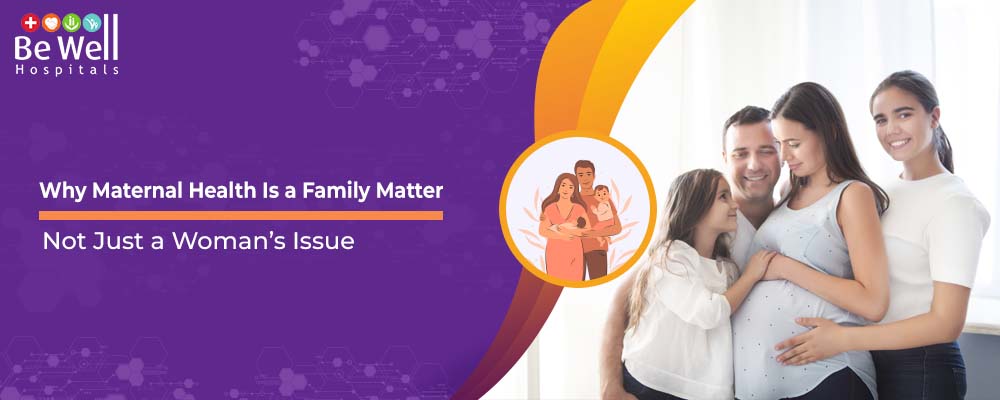Why Maternal Health Is a Family Matter, Not Just a Woman’s Issue

Introduction
Maternal health encompasses the physical, emotional, and social well-being of women during one of the most critical periods of life—before, during, and after pregnancy. It is not just about ensuring safe childbirth but also about supporting a woman’s overall health journey as she prepares for motherhood, experiences the challenges of pregnancy, and recovers post-delivery. Despite its significance, maternal health is often misunderstood as solely a “woman’s issue,” when in reality, it impacts entire families and communities. A mother’s health has direct consequences on the health and development of her child, the stability of the family unit, and even broader societal outcomes like economic productivity and public health. In this blog, we aim to explore why maternal health matters deeply—not just for women, but for everyone. We’ll break down its different stages, address the common misconceptions, and shed light on how nurturing maternal health is an investment in a healthier, stronger future for all.
The Ripple Effect of Maternal Health on the Family
The health of a mother plays a pivotal role in shaping the overall well-being of her family, creating a ripple effect that touches every member. When mothers are healthy—both physically and mentally—they are better equipped to care for their new-borns, nurture their children, and manage the demands of daily life. This equation is simple yet profound: healthy mothers lead to healthy babies, and healthy babies contribute to strong, thriving families. A mother’s physical well-being directly influences her child’s growth, while her mental health deeply affects the emotional security and cognitive development of the child. On the other hand, when maternal health is compromised, it can lead to a cascade of challenges: complications in childbirth, delayed child development, postpartum depression, and increased stress for other family members. Such strain not only disrupts the family dynamic but can also burden the household financially and emotionally. Thus, investing in maternal health is not just about safeguarding one life—it’s about empowering families and ensuring a resilient, nurturing environment for generations to come.
Partners and Family Members Play a Crucial Role
Partners and family members play a vital role in supporting maternal health, not just during pregnancy but throughout the postpartum period. Their emotional presence and reassurance can ease anxiety, reduce stress, and create a sense of stability for expectant and new mothers. Sharing responsibilities like child-rearing, household chores, and making informed healthcare decisions helps distribute the mental and physical load, allowing mothers to recover and care for their newborns more effectively. One of the most crucial aspects is being able to recognize the signs of postpartum depression—such as mood changes, withdrawal, or overwhelming fatigue—and offering timely, compassionate support or seeking professional help when needed. Active involvement from fathers, in particular, has been shown to positively influence maternal well-being and infant development. When fathers engage consistently, both mother and baby benefit from improved emotional bonding, better health outcomes, and a more balanced home environment. This shared journey of parenthood not only strengthens relationships but also sets the foundation for a healthier, happier family.
Maternal Health as a Societal and Economic Concern
Maternal health goes far beyond an individual or family concern—it is a foundational pillar for a thriving society and economy. When maternal care is neglected, the ripple effects can impact generations, systems, and national progress.
Investing in maternal health is not just a healthcare priority—it is a societal responsibility. Strong mothers build strong communities, and by protecting them, we safeguard the future of everyone.
Breaking Cultural Myths and Promoting Shared Responsibility
In many cultures, maternal health has long been viewed as solely a woman’s responsibility, leading to harmful isolation during one of life’s most vulnerable and critical phases. Breaking these outdated beliefs is essential to ensure that mothers receive the emotional, physical, and social support they need. Inclusive prenatal and parenting education must involve partners, grandparents, and family members to create a culture where maternal well-being is seen as a shared responsibility, not a private burden. Equally important is building strong community-based support systems—such as doulas, midwives, and mental health professionals—who can provide culturally sensitive care and bridge gaps in healthcare access. When we challenge myths and promote inclusivity, we empower entire families and communities to prioritize maternal health together.
How Families Can Support Maternal Health
Supporting maternal health is not just the responsibility of medical professionals—families play a crucial role in ensuring a safe and healthy journey through pregnancy, childbirth, and postpartum recovery. Here's how families can contribute meaningfully.
By taking these proactive steps, families can significantly improve maternal outcomes and emotional well-being. Together, we can build a nurturing environment where mothers feel supported, valued, and empowered throughout their motherhood journey.
Conclusion
Maternal health is not just about the well-being of mothers but is foundational to the health and prosperity of entire families. When mothers are supported physically, emotionally, and mentally, the ripple effect reaches their children, partners, and the community at large. We must recognize that a thriving mother leads to a flourishing family, and this can only be achieved through collective efforts from families, partners, and communities. It’s time to break away from old, isolating beliefs and embrace the shared responsibility of nurturing maternal health.
To ensure the best for mothers and families, seek support and expert care when needed. Visit our Obstetrics & Gynecology Department at Be Well Hospitals or call 9698 300 300 to book an appointment and start your journey toward a healthier future for all.
